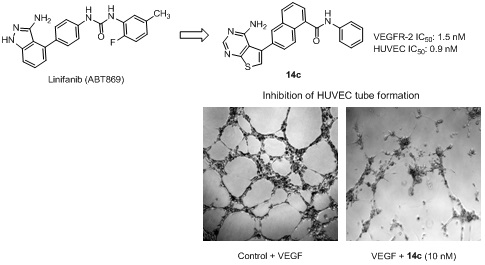Many factors are involved in tumor angiogenesis, among which the vascular endothelial growth factors (VEGFs) play a major role. Over activation of vascular endothelial growth factor receptors (VEGFRs), especially VEGFR-2, is closely related to poor prognosis and metastasis in the majority of solidtumor patients. The VEGF-mediated VEGFR-2 signaling promotes several endothelial responses required for the formation of new blood vessels, such as cell proliferation, migration, and survival. As VEGFR-2 signaling is important in tumor angiogenesis, blocking VEGFR-2 signaling pathway has become an attractive approach for the treatment of cancers. Receptor tyrosine kinase (RTK) inhibitors that target VEGFR-2 have been demonstrated to possess substantial antitumor activity, and generally they are ATP-competitive small molecule inhibitors. In fact, six such inhibitors (sorafenib, sunitinib, pazopanib, axitinib, vandetanib, and regorafenib) targeting VEGFR-2 and/or other kinases have been approved for the treatment of cancers. Using linifanib (ABT-869) as a lead compound, Prof. DUAN Wenhu and DING Jian groups in Shanghai Materia Medica, Chinese Academy of Sciences design and synthesis a new series of naphthamides as potent VEGFR-2 inhibitors.Privileged compound 14c exhibited high potency in both enzymatic and cellular assays.Kinase selectivity profiling revealed that 14c was a multitargeted inhibitor, and it also exhibited good potency against VEGFR-1, PDGFR-β, and RET. Furthermore, 14c effectively blocked tube formation of HUVEC atnanomolar level. This work has been published on ACS Medicinal Chemistry Letters. 
|

